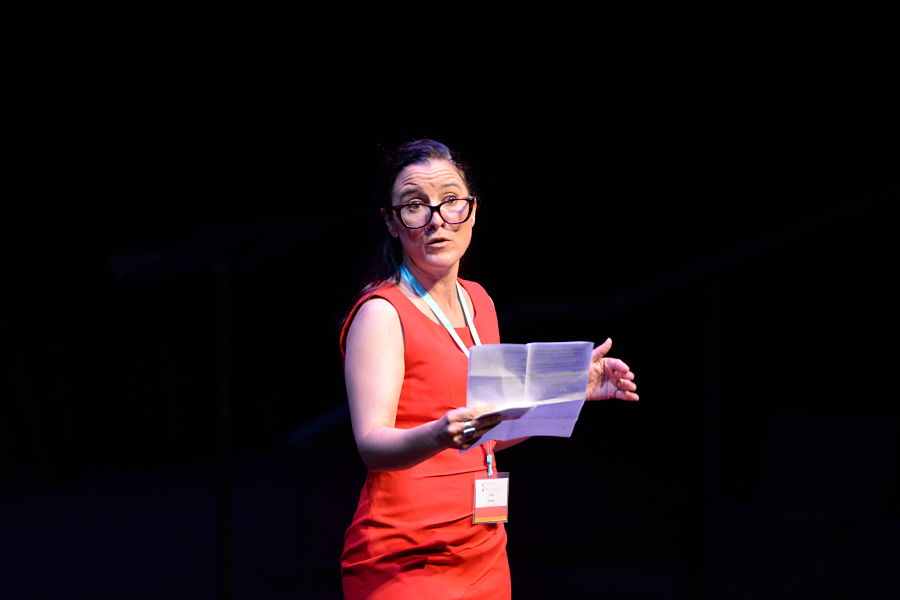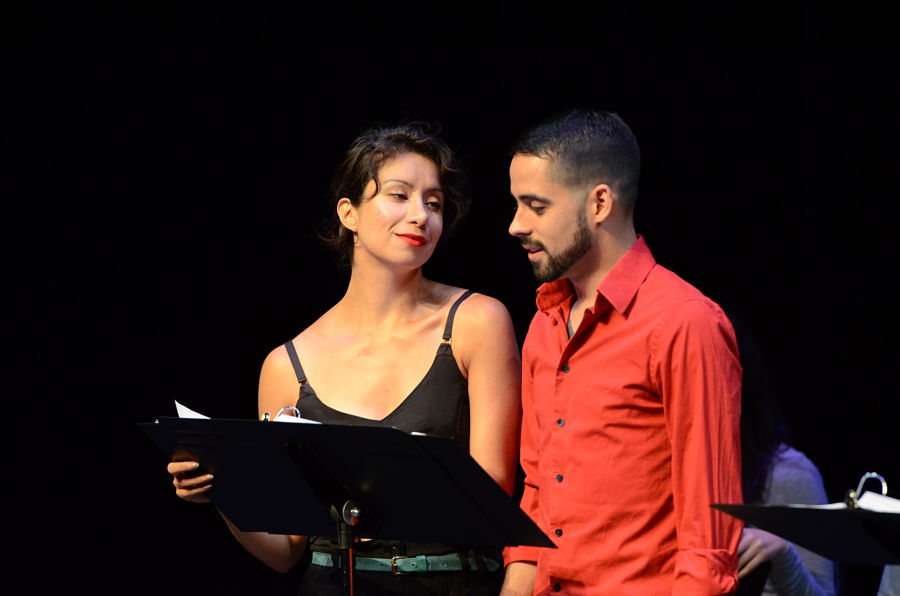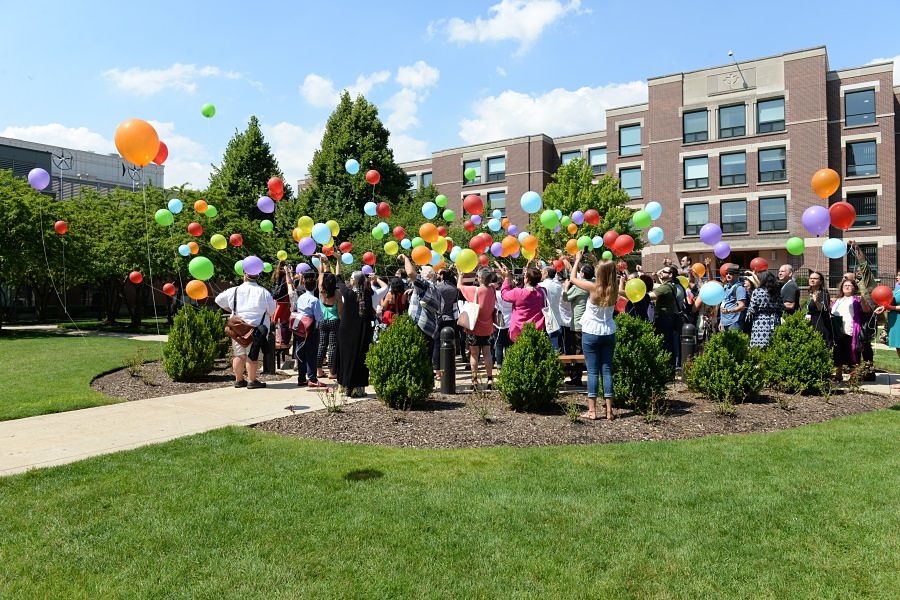CHICAGO: A riot of balloons against a crystal-blue Chicago sky announced the arrival of the Latina/o Theatre Commons Carnaval 2015—and with it came an embarrassment of riches in new writing from Latino playwrights. From July 23 to 25, more than 200 participants saw 8 staged readings and excerpts from 4 more new plays, encompassing what LTC Carnaval chair Lisa Portes described as “generational, geographic, and aesthetic diversity.”
The (biodegradable) balloons released on the quadrangle of DePaul University, whose Theatre School hosted Carnaval, provided visual representation of LTC’s desire to “seed the field,” as Portes, who serves as head of the Theatre School’s MFA directing program, put it.
“Cafécitos”—open discussions over morning coffee—as well as breakout sessions, receptions, and productions outside the festival’s programming, such as Chicago’s youth-oriented Albany Park Theatre Project’s Feast at the Goodman Theatre on Friday evening, provided opportunities for networking, nagging, and woodshedding ideas for further action.
LTC began in May of 2012 when playwright Karen Zacarías brought together 8 Latina/o theatremakers under the umbrella of the “theatre commons” site HowlRound in Washington, D.C., to discuss the critical need for more Latino voices in the American theatre. From that initial gathering emerged a checklist for LTC (and last year’s Encuentro in L.A.); in her opening remarks on Thursday, July 23, Portes happily went through each of the now-completed action items, or “five dreams,” that culminated in Carnaval.
In part, both Carnaval and LTC seek to fill the gap left by the demise of programs such as South Coast Repertory’s Hispanic Playwrights Project, which ran from the early 1980s to 2003, and Los Angeles Center Theatre Group’s Latino Theatre Initiative at Mark Taper Forum, which closed in 2005.
“We have four tenets in the Latino/a Theatre Commons, and one of them is advocacy, and this is really an advocacy event,” said Portes. (The others are artmaking, convening, and scholarship.) “Because we’re not a producing organization, we’re not going to produce any of these plays. We don’t have any vested interest…The whole point of this event is to bring people together and see the breadth and vitality and sheer freaking talent of Latino writers.”

In addition to Latino theatre artists, participants included academics and theatre producers from 30 states, Washington, D.C., and Puerto Rico. Kelly Edwards, HBO’s vice president of talent development and programming, who developed the HBOAccess writing program, was also in the audience. In a February article on Huffington Post, Edwards described the program as being “on the lookout for new voices with an authentic and original point of view.”
In her opening remarks, Portes described the Carnaval lineup as encompassing “straightahead realism, to magic realism, to a deeply personal bilingual performance piece, to an adult fairy tale, to an explosion of Fellini’s Satyricon, to a spoken-word romance, a docudrama, a theatrical graphic novel, a musical, an historic drama and a riff on the future fallout of The Grapes of Wrath.”
I saw seven and a half of the readings. (A prior commitment caused me to miss the second act of Octavio Solis’s Mother Road, the aforementioned riff on Steinbeck’s classic, in which the sole direct descendant of Tom Joad—a Mexican-American farm worker with a difficult past—joins the current owner of the Joad farm on a reverse commute from California to Oklahoma.) Perhaps fittingly for a festival devoted to birthing new work, several of the pieces featured themes of birth, parentage, and separation from one’s roots—though, as Portes noted, aesthetic and dramaturgical approaches varied wildly.
The first reading on Thursday, the living’life of the daughter mira by Matthew Paul Olmos, followed the struggle of a premature infant to connect in a sort of alternative reality/dream world with her father, constituting a form of “magical urbanism,” as Portes noted. Poet/playwright Magdalena Gomez’s Perfectamente Loca/Perfectly Insane provided a bilingual meditation on her own mother’s abusive upbringing in the slums of San Juan and how that filtered through to her Bronx childhood. In Mando Alvarado’s Parachute Men, a trio of brothers confronted the effects that their mother’s suicide had on their relationships. (Alvarez’s darkly comic but realist play won the moniker “sausage realism,” thanks to a scatological running joke.)
The committee whittled the slate down from 88 initial submissions. “We wanted to make sure we had somebody really young, like Emilio [Rodriguez], who only had one reading before, and then a veteran like Octavio,” explained Portes. Rodriguez’s Swimming While Drowning traced the attraction between two homeless gay teens in a shelter, whose explorations into spoken word and rap deepen their understanding of themselves and each other.
The committee also sought gender parity, and in fact went beyond it—8 of the 12 plays presented were by women, and the 8 readings were evenly divided between men and women. Perhaps the most stylistically ambitious piece, Georgina Escobar’s comic sci-fi epic Sweep, envisioned a pair of time-traveling “sweepers” bent on upending the cultural mayhem unleashed by the Adam and Eve mythology.

In a breakout session for scholars, esteemed veterans of Latino theatre such as Luis Valdez, the father of Chicano theatre at El Teatro Campesino and author of Zoot Suit, as well as established and emerging academics and critics, tossed out ideas for furthering the work of Latino writers. Carla Della Gatta, a newly minted Ph.D. from Northwestern University who is headed to University of Southern California’s School of Dramatic Arts this fall, spoke of the need for “Wikiturgy”—creating Wikipedia pages for Latino writers and artists that would make their work easily searchable. “There is no page on Wikipedia for ‘Latino theatre,'” said Della Gatta.
The issue of accessibility came up several times. The success of Lin-Manuel Miranda’s Hamilton may show the ability of Latino voices to go “mainstream,” but as more than one participant in the breakout noted, Broadway isn’t an affordable ticket option for many young Latinos.
Though future plans for another Carnaval haven’t yet been finalized, Portes said the work continues.
“We are actively fundraising to help other organizations that may not be in cities like Chicago to produce the work [from Carnaval],” said Portes. “I really believe that the more you’re exposed to the stories, the more interested you become. It’s not like, ‘Oh, that one Latino play I saw.’ There are 12 Latino plays you see, and suddenly you see all kinds of possibilities that you may not have seen before. It’s by offering a great menu—offering it regularly—and then helping theatres financially, in a way. We’re putting our money where our mouth is and helping theatres produce the work.”


